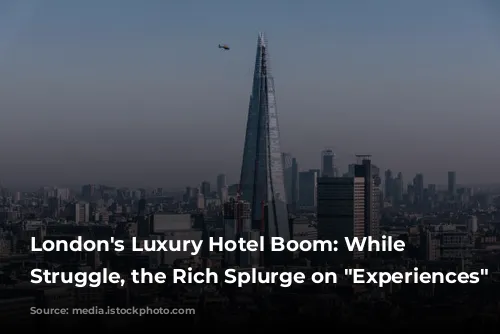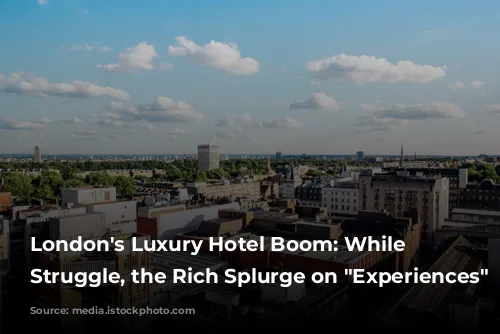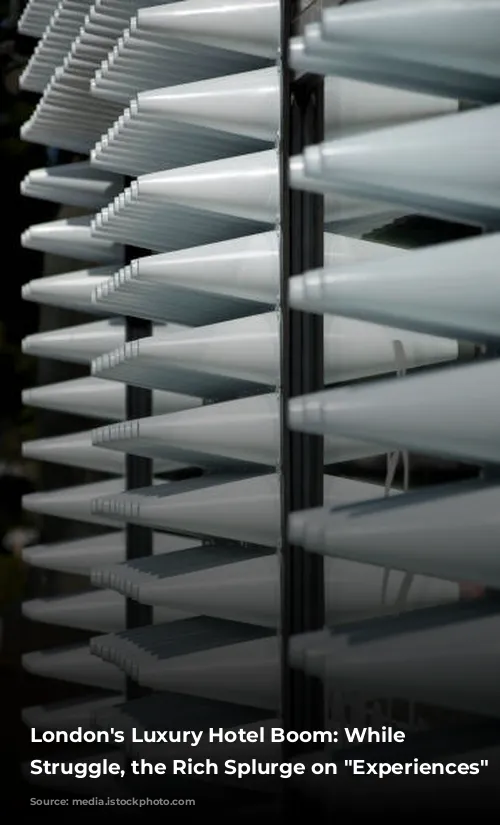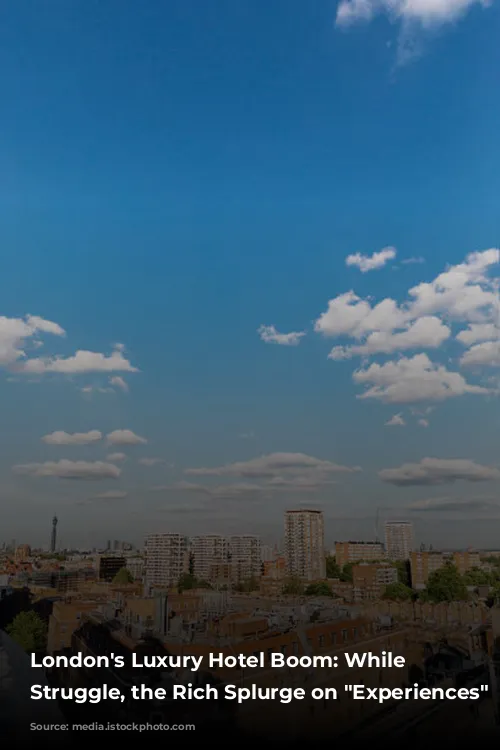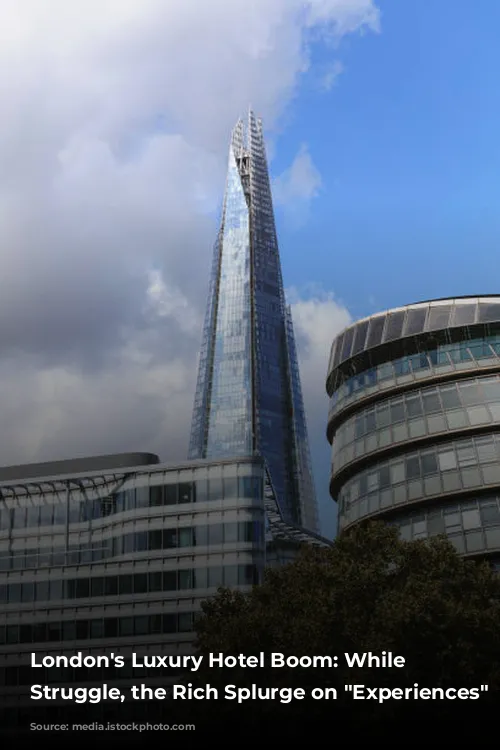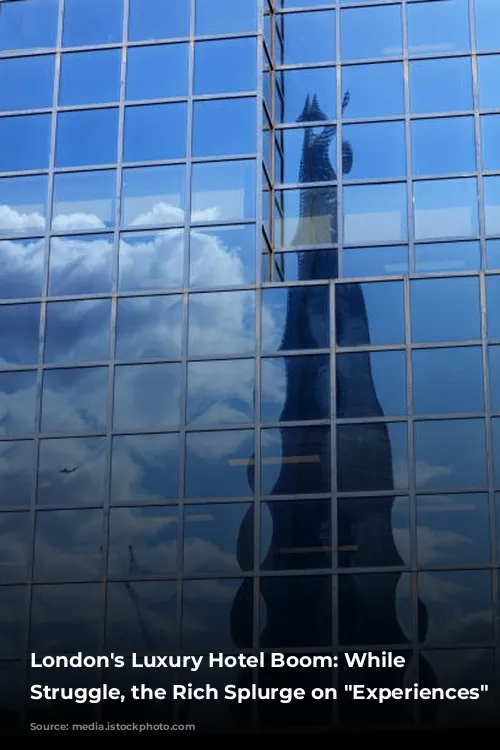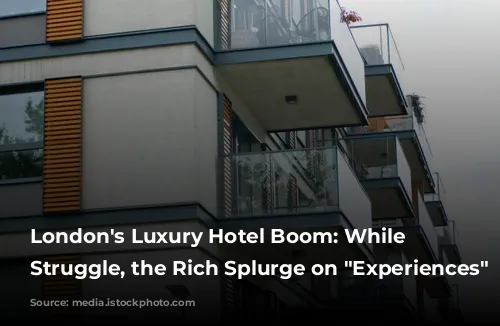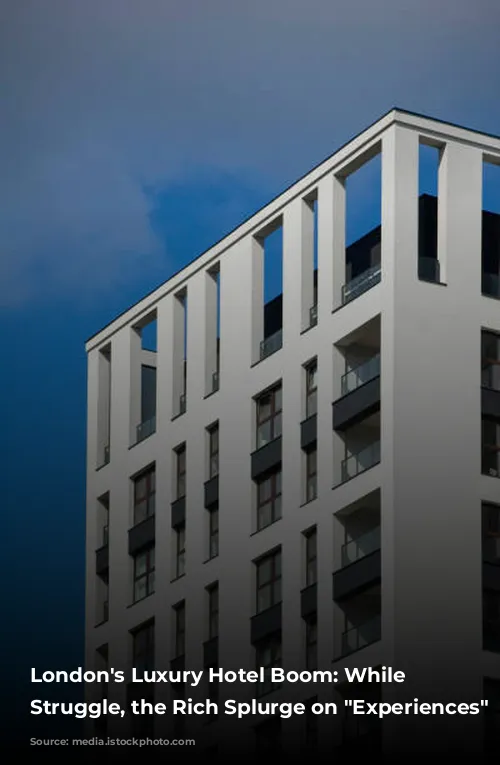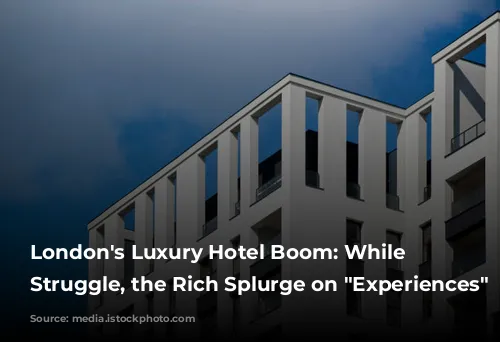While many Britons grapple with rising living costs, a different world exists in the heart of London, where a new wave of ultra-luxurious hotels is breaking records with room rates exceeding £1,000 a night. This surge in extravagance is fueled by wealthy visitors seeking exclusive “experiences” that only substantial wealth can afford.
The Peninsula on Hyde Park Corner, a stone’s throw from Buckingham Palace, epitomizes this trend, with starting room rates reaching a regal £1,300 per night. Despite the eye-watering price tag, the hotel is fully booked, reflecting the growing demand for lavish accommodations. The hotel’s manager, Joseph Lee, reports an impressive occupancy rate, attributing it to the hotel’s popularity since its opening. The Peninsula’s success is further amplified by its strong booking outlook for the holiday season, promising a bustling Christmas.
Step inside the Peninsula’s grand lobby, and you’ll be greeted by a flurry of activity. Dressed in pristine white uniforms, the hotel’s signature “pages” resemble dapper telegram boys from the Roaring Twenties, their constant motion adding a touch of charm to the atmosphere. Guests indulge in high-end snacks and £110 high teas, enjoying the view of the vibrant traffic navigating Wellington Arch.
The hotel’s amenities take extravagance to new heights. The elevator to the Brooklands rooftop restaurant, boasting a motor and aviation theme, resembles a hot air balloon basket, giving guests a sense of weightlessness. The bar offers a unique touch – pulling a lever in the plush banquette’s armrest summons another drink. The restaurant, adorned with a Concorde-inspired sculpture, presents a £195-a-head tasting menu, promising a culinary journey for discerning palates. Outside, a fleet of luxury vehicles, including two Rolls-Royce Phantoms, awaits to whisk guests around the city’s iconic sights.
A World of Luxury and Exclusivity
While the cost of living crisis impacts many, the luxury hotel market is thriving, catering to a growing segment of affluent travelers seeking unparalleled experiences. Fflur Roberts, head of luxury goods at market research firm Euromonitor, notes that these super-luxe hotels are popping up in global tourist destinations, reflecting the 1%’s increasing focus on “experiences”. Global luxury hotel market figures tell a compelling story – the market is currently valued at £55 billion and is projected to reach £80 billion within four years, signaling a booming industry.
Roberts highlights the disparity between the struggles of many and the vast wealth concentrated in a select few. She observes a shift in the market, with room rates surpassing £1,000 becoming commonplace, a significant jump from the £500 to £600 price range seen a few years ago. These establishments transcend the traditional notion of a hotel; they are self-contained resorts offering a multitude of amenities, including gourmet restaurants, state-of-the-art gyms, and luxurious wellness spaces. This constant elevation of luxury is a defining characteristic of this burgeoning sector, pushing the boundaries of exclusivity.
A Surge in Luxury Accommodations
The Peninsula is not an anomaly; the London luxury hotel scene is experiencing a major surge in new and refurbished properties. CoStar, a property information company, reports that this year will see the arrival of over 1,000 new or renovated luxury hotel rooms in London, marking the most significant increase since the 2012 Olympics.
This influx of opulent accommodations includes several high-profile additions to the London landscape. The historic Old War Office building, after a meticulous £1.4 billion refurbishment, has been reborn as Raffles London at the OWO, located near Whitehall. Mayfair will soon welcome a second Mandarin Oriental, while a new sister hotel to the renowned Claridge’s, the Emory, is also set to open. These are just a few examples of the burgeoning luxury hotel scene in the capital.
In a business driven by relentless competition, Claridge’s has made a bold statement with its newly remodelled penthouse, boasting a price tag of £60,000 per night. The lavish space is adorned with 75 works by Damien Hirst, further cementing its status as a pinnacle of luxury.
International Tourism Returns, Fueled by High Rollers
The luxury hotel boom is being fueled by a resurgence in international tourism, with visitors eager to experience London’s vibrant offerings. Following the pandemic-induced hiatus, international travel has roared back, and there appears to be no shortage of high-rollers seeking premium accommodations.
London is expected to welcome nearly 16 million visitors this year, an impressive 18% increase from last year, signifying a strong return to pre-pandemic levels. This influx of tourists is expected to generate £13.4 billion in spending, a 25% jump compared to the previous year. These figures demonstrate the resilience and growth of London’s tourism industry, a vital driver of the city’s economy.
Record-Breaking Prices Reflect Growing Demand
Luxury hoteliers have capitalized on the rebounding tourism market, implementing significant room rate increases, reaching unprecedented levels. Cristina Balekjian, CoStar’s director of UK hospitality analytics, highlights the remarkable price hikes achieved by luxury hotels, attributing it to robust demand. She anticipates that 2023 will be another record year for the luxury hotel sector, a testament to the industry’s continued growth.
The location of Raffles London at the OWO adds to its allure. Nestled in a prime tourist spot, guests have breathtaking views of iconic London landmarks right from the hotel’s doorstep. The right view offers a glimpse of Nelson’s Column, while to the left stands the Palace of Westminster. Horse Guards Parade and mounted soldiers with gleaming helmets add a touch of historical grandeur to the scene.
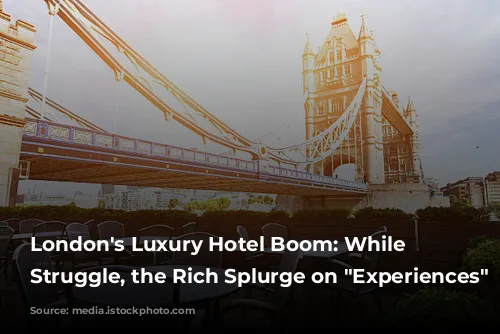
Exclusivity and Price Insensitivity
The hotel’s location, coupled with its historical significance, justifies its premium pricing. The hotel boasts “one of the most powerful addresses in London,” with even the smallest rooms starting at £1,100 per night. The hotel’s storied past is further highlighted in its most coveted rooms, such as the Haldane suite, once Winston Churchill’s office, commanding a price tag that adds another zero, and then some, to the base rate. For those seeking a luxurious experience, the hotel offers bespoke toiletries under the 1906 brand, crafted with a unique scent designed by perfume designer Azzi Glasser.
Raffles London’s historical connections to prominent political figures and its role in daring wartime espionage add another layer of intrigue to the hotel’s allure. The Guards Bar, where guests can sip on a £24 London Sling, a local twist on the famous Raffles Singapore sling, further enhances the hotel’s luxurious appeal.
While room rates may seem extraordinary, the stratospheric prices have paradoxically heightened the allure of these luxury hotels. Andrew Sangster, from the industry news service Hotel Analyst, explains that the ultra-wealthy are price insensitive, placing a premium on exclusivity. The Hermès scarf analogy is apt; its value lies in the brand and exclusivity, not its practical utility. Setting high prices becomes a statement of exclusivity, signaling that the hotel is not for everyone.
The luxury hotel market caters to a diverse clientele with deep pockets. Sangster notes that while some suites are priced at £100,000, targeting high-net-worth individuals, the £1,000 range attracts moderately wealthy individuals, entrepreneurs, and senior executives. He emphasizes that even if a suite is only booked every other day, its ability to generate significantly higher revenue than regular rooms justifies its high price. This dynamic is evident in the current market, where most of these rooms and suites are fully booked.
